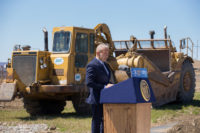
BP Pleads Guilty to Felony Charges, Hit With Record Fines
In a historic negotiated settlement announced on Nov. 15, BP agreed to plead guilty to felony manslaughter, environmental crimes and obstruction of justice and to pay more than $4 billion in criminal fines and penalties for its conduct leading to the devastating Deepwater Horizon disaster in 2010. The settlement, the largest of its kind in U.S. history, should give a boost to the cleanup and restoration effort in the Gulf of Mexico.
A significant portion of the fines will go directly toward Gulf restoration and cleanup, Justice Dept. officials said at a Nov. 15 press conference in New Orleans. According to officials, $2.4 billion of the DOJ settlement is expected to head to Gulf Coast states. Half that amount will go toward protecting and preserving coastal environments in Florida, Alabama, Mississippi and Texas. The other $1.2 billion will go toward coastal restoration efforts in Louisiana.
Further, Attorney General Eric Holder said three individuals from BP would be indicted; two supervisors who were on the Deepwater Horizon when the explosion happened will face manslaughter charges; and another high-ranking official will face obstruction-of-Congress charges for allegedly lying to Congress and law enforcement officials. Holder said the criminal investigation continues and that the Justice Dept. is preparing for the February-slated civil trial, in which Clean Water Act penalties may apply. BP, in a statement, said it would "vigorously defend" itself against any remaining civil claims.
Total Construction Starts Up 4 Percent Over First Ten Months of 2011
The dollar value of total new construction starts through the first 10 months of this year was $390.4 billion, which was 4% above the same period of 2011, according to McGraw-Hill Construction. Most of the year-to-year gains came from a 28% increase in the dollar value of new residential construction and a 6% increase non-building construction. The non-residential building market continues to show some weakness, with total construction in the first 10 months of this year 14% below a year ago. Despite the year-to-year upticks, construction posted a sharp monthly decrease of 14% between September and October. Most of the monthly decline was due to a pullback in the electric-power and gas-plant category. If this volatile project type is excluded from the month-to-month comparisons, total construction starts in October would register a 3% gain. McGraw-Hill Construction estimates that total construction starts will end the year with a 5% gain (see p. 29).
USGBC Launches Pilot Program To Evaluate Sustainability
Thirty North American cities and counties will participate in a year-long pilot program to evaluate and test the first national rating system for community sustainability. The program was announced on Nov. 14 at the U.S. Green Building Council's (USGBC) Greenbuild conference, held in San Francisco on Nov. 14-16.
The STAR Community Rating System is the nation's first voluntary, self-reporting framework for evaluating the sustainability of communities. The so-called STAR Pilot Communities will be the first to receive a community sustainability rating using a technical guide, an online reporting tool, and various products and services.
The idea for the program dates back to 2007, when ICLEI-Local Governments for Sustainability, USGBC and the Center for American Progress launched the concept for the rating system at Greenbuild in Chicago. "This groundbreaking system—designed and built by local governments—is a huge accomplishment that will unleash local leadership in sustainability," says Jason Hartke, vice president for national policy at USGBC. "When we embarked on this effort five years ago, we wanted to accelerate the great work cities and counties were doing to create strong, sustainable and more resilient communities," he says.
U.S. Sues KBR for False Claims Related to Iraqi Military Housing
The United States has filed a civil complaint against Houston-based Kellogg, Brown & Root Services Inc. (KBR) and First Kuwaiti Trading Co. for submitting inflated claims for the delivery and installation of trailers to house U.S. troops in Iraq, the U.S. Justice Dept. announced on Nov. 19. First Kuwaiti, a KBR subcontractor, is based in Kuwait. In 2001, KBR was awarded a multibillion-dollar contract to become the Army's primary contractor for logistical support in Iraq. According to the complaint, KBR awarded a subcontract worth $80 million to First Kuwaiti on Oct. 16, 2003, to supply, transport and install 2,252 living containers for U.S. troops, who were living in tents in Iraq. First Kuwaiti presented claims to KBR contending the government caused delays in providing military escorts for convoys into Iraq, and KBR agreed to pay the firm an additional $48.8 million, passing the cost on to the government. The U.S. complaint alleges that the costs were knowingly inflated.





